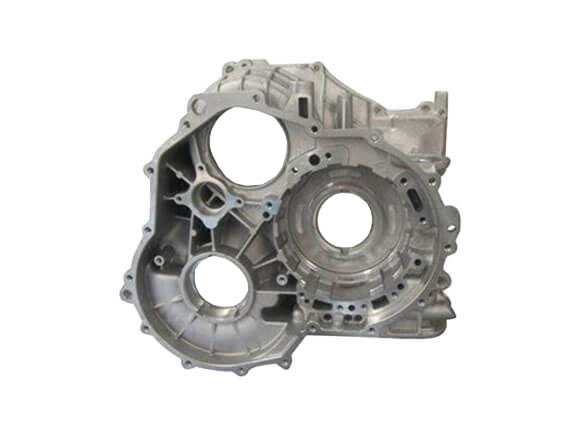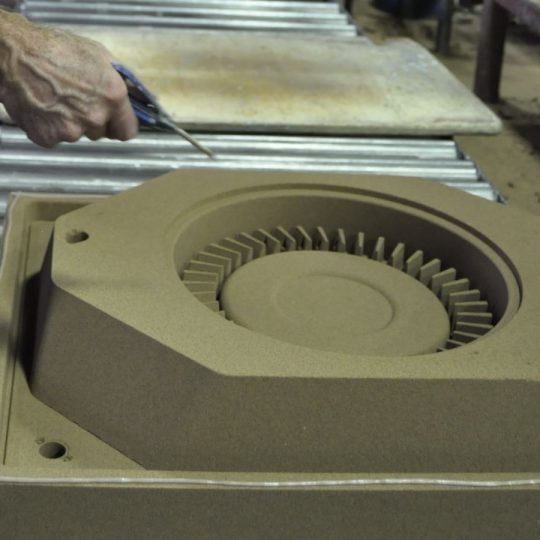Methods to Optimize Your aluminum casting Process for Better Results
Discover the Advantages of Aluminum Casting in Modern Production
Aluminum casting has actually emerged as an essential procedure in modern-day production. Its lightweight yet durable nature offers significant advantages for various markets. The capability to achieve detailed layouts and maintain limited tolerances contributes to its charm. Precision aluminum casting. Additionally, the cost-effectiveness and ecological benefits make it a sustainable option. As producers look for cutting-edge services, the function of aluminum casting proceeds to evolve. What details applications and benefits await exploration in this vibrant field?
Lightweight Yet Solid: The Benefits of Aluminum
Lots of materials are used in manufacturing, aluminum stands out due to its impressive mix of lightweight properties and outstanding strength. This special quality makes aluminum an excellent selection for numerous applications, particularly in sectors such as automotive, aerospace, and construction. Its reduced thickness permits easier handling and transportation, adding to reduced power intake throughout manufacturing and assembly procedures.
Aluminum's strength-to-weight proportion is impressive, making it possible for manufacturers to develop sturdy elements without adding unnecessary bulk. This characteristic is particularly important in fields where weight reduction can cause enhanced gas efficiency and general performance. Additionally, aluminum's resistance to rust improves the long life of products, even more solidifying its allure in modern production.
Eventually, the lightweight yet strong nature of aluminum positions it as a favored material, fostering innovation and effectiveness throughout multiple fields. Makers significantly recognize that these advantages can result in significant developments in style and capability.
Precision and Intricacy in Design
As makers embrace the capabilities of aluminum casting, they find new methods for precision and complexity in design. This manufacturing process permits the development of complex shapes and comprehensive features that standard approaches typically have a hard time to attain. The fluidity of molten aluminum allows it to load complex molds, causing parts with limited resistances and fine surface area finishes.
This precision is specifically advantageous in markets such as aerospace and vehicle, where precise requirements are vital for performance and security. Aluminum casting additionally fits innovative designs that improve capability without jeopardizing architectural honesty.

Cost-Effectiveness and Efficiency
Cost-effectiveness and effectiveness are vital considerations for manufacturers checking out aluminum casting as a manufacturing approach. Aluminum casting deals significant price benefits due to its reduced material expenses contrasted to other steels (Precision aluminum casting). The light-weight nature of aluminum minimizes shipping and handling expenses, and its outstanding thermal conductivity permits quicker cooling times during the casting procedure, boosting general manufacturing speed
Additionally, aluminum's adaptability makes it possible for makers to develop intricate shapes and layouts, lessening the need for added machining or assembly. This streamlining of production not just decreases labor costs but also shortens preparations, allowing business to react quickly to market demands.
Furthermore, the sturdiness and rust resistance of aluminum spreadings add to longer item lifespans, minimizing replacement prices in time. Therefore, manufacturers can accomplish a balance of top notch result and minimized functional costs, making aluminum casting a progressively appealing choice in modern manufacturing.
Ecological Sustainability of Aluminum Casting
Aluminum casting stands out as an eco sustainable production option, especially as a result of its recyclability and decreased eco-friendly impact. The process enables the effective usage of aluminum, a product that can be recycled indefinitely without shedding its residential or commercial properties. This characteristic significantly lowers the demand for virgin aluminum, consequently preserving natural resources and reducing energy consumption related to extraction and processing.

Applications Across Industries: From Automotive to Aerospace
While content diverse industries remain to seek ingenious website here products for manufacturing, aluminum casting has confirmed to be a flexible remedy throughout markets such as vehicle and aerospace. In the vehicle market, aluminum castings add to lightweight car designs, boosting gas efficiency and performance. Parts like engine blocks, transmission housings, and wheels profit from aluminum's strength-to-weight proportion.
In a similar way, in aerospace, aluminum casting plays a significant role in producing complex parts that call for high durability and reduced weight. Aircraft components such as brackets, touchdown equipment, and architectural frameworks make use of aluminum for peak performance and safety and security.
In addition, the adaptability of aluminum casting enables it to cater to other industries, consisting of customer electronics, aquatic, and industrial equipment. This convenience not only satisfies the particular requirements of numerous applications however additionally sustains ongoing development in producing procedures. Consequently, aluminum casting stays a principal in contemporary manufacturing throughout countless industries.
Often Asked Concerns
Exactly How Does Aluminum Casting Compare to Other Metal Casting Procedures?
Aluminum casting offers premium strength-to-weight ratios, faster air conditioning prices, and exceptional rust resistance contrasted to various other steel casting procedures. These benefits make it excellent for different applications, improving efficiency and performance in manufacturing.
What Are the Regular Lead Times for Aluminum Casting Projects?
Typical preparation for aluminum casting jobs vary from 2 to 8 weeks, relying on factors such as intricacy, order dimension, and manufacturing capability. Reliable preparation can assist lessen hold-ups and improve job timelines.
Can Aluminum Casting Be Used for Intricate Layouts?
Aluminum casting can indeed fit intricate styles. Precision aluminum casting. Its fluidity enables for in-depth patterns and forms, making it ideal for complex parts in various industries. This adaptability boosts design flexibility while maintaining architectural stability and performance
What Post-Processing Options Are Offered After Aluminum Casting?
Post-processing options for aluminum casting include machining, polishing, surface therapies, anodizing, and you can look here welding. These strategies enhance the finish, improve dimensional accuracy, and boost rust resistance, consequently enhancing the final product's performance and visual appeal.
How Do Temperature Level Modifications Affect Aluminum Casting High Quality?
Temperature level adjustments significantly influence aluminum casting top quality by influencing fluidness, solidification rates, and prospective problems. Fast air conditioning can result in increased brittleness, while too much warmth may trigger warping or incomplete dental filling of mold and mildews throughout casting.
Aluminum casting has actually arised as a pivotal process in modern production. As producers embrace the capabilities of aluminum casting, they find new opportunities for precision and intricacy in style. Aluminum casting procedures normally create less greenhouse gas discharges compared to other metal casting techniques. While diverse sectors proceed to look for ingenious products for production, aluminum casting has actually confirmed to be a functional service across fields such as vehicle and aerospace. In the auto market, aluminum castings add to light-weight vehicle styles, boosting gas efficiency and performance.